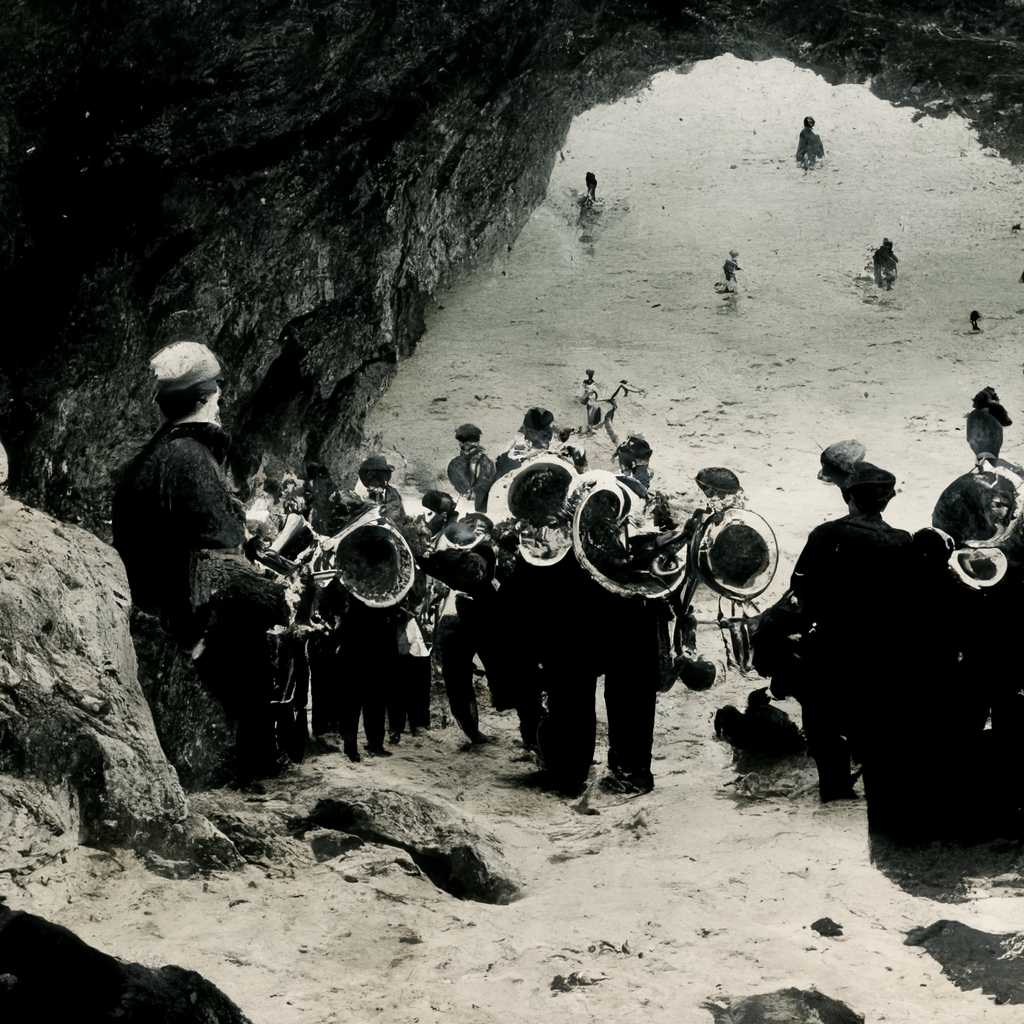WELSH INCIDENT
By:
April 9, 2023
A series dedicated to poems, published c. 1900–1935, the Radium Age sf-adjacent themes of which include: dystopia and utopia, far-out mathematics and the fourth dimension, Afro-futurism, catastrophe, future war, new technologies, scientific breakthrough, dehumanization, cosmic awe, disenchantment and unseen forces, unknowable aliens and singularity. Research and selection by Joshua Glenn; thematic index here.

‘But that was nothing to what things came
out
From the sea-caves of Criccieth yonder.’
‘What were they? Mermaids? Dragons?
Ghosts?’
‘Nothing at all of any things like that.’
‘What were they, then?’
‘All sorts of queer things,
Things never seen or heard or written
about,
Very strange, un-Welsh, utterly peculiar
Things. Oh, solid enough they seemed to
touch,
Had anyone dared it. Marvellous creation,
All various shapes and sizes, and no sizes,
All new, each perfectly unlike his
neighbour,
Though all came moving slowly out
together.’
‘Describe just one of them.’
‘I am unable.’
‘What were their colours?’
‘Mostly nameless colours,
Colours you’d like to see; but one was puce
Or perhaps more like crimson, but not
purplish.
Some had no colour.’
‘Tell me, had they legs?’
‘Not a leg or foot among them that I saw.’
‘But did these things come out in any
order?
What o’clock was it? What was the day of
the week?
Who else was present? How was the
weather?’
‘I was coming to that. It was half-past three
On Easter Tuesday last. The sun was
shining.
The Harlech Silver Band played Marchog
Jesu
On thirty-seven shimmering instruments
Collecting for Caernarvon’s (Fever) Hospital
Fund.
The populations of Pwllheli, Criccieth,
Portmadoc, Borth, Tremadoc,
Penrhyndeudraeth,
Were all assembled. Criccieth’s mayor
addressed them
First in good Welsh and then in fluent
English,
Twisting his fingers in his chain of office,
Welcoming the things. They came out on
the sand,
Not keeping time to the band, moving
seaward
Silently at a snail’s pace. But at last
The most odd, indescribable thing of all
Which hardly one man there could see for
wonder
Did something recognizably a something.’
‘Well, what?’
‘It made a noise.’
‘A frightening noise?’
‘No, no.’
‘A musical noise? A noise of scuffling?’
‘No, but a very loud, respectable noise —
Like groaning to oneself on Sunday
morning
In Chapel, close before the second psalm.’
‘What did the mayor do?’
‘I was coming to that.’
— “The Welsh Incident” was initially published in Poems (1929) and titled “The Railway Carriage.” It is now better known by the name given to the version in Collected Poems (1975). Graves was born in London but spent his family holidays in Wales; he wrote the poem to be recited/read in a Welsh accent.
RADIUM AGE PROTO-SF POETRY: Stephen Spender’s THE PYLONS | George Sterling’s THE TESTIMONY OF THE SUNS | Archibald MacLeish’s EINSTEIN | Thomas Thornely’s THE ATOM | C.S. Lewis’s DYMER | Stephen Vincent Benét’s METROPOLITAN NIGHTMARE | Robert Frost’s FIRE AND ICE | Aldous Huxley’s FIFTH PHILOSOPHER’S SONG | Sara Teasdale’s “THERE WILL COME SOFT RAINS” | Edith Södergran’s ON FOOT I HAD TO… | Robert Graves’s WELSH INCIDENT | Nancy Cunard’s ZEPPELINS | D.H. Lawrence’s WELLSIAN FUTURES | & many more.
